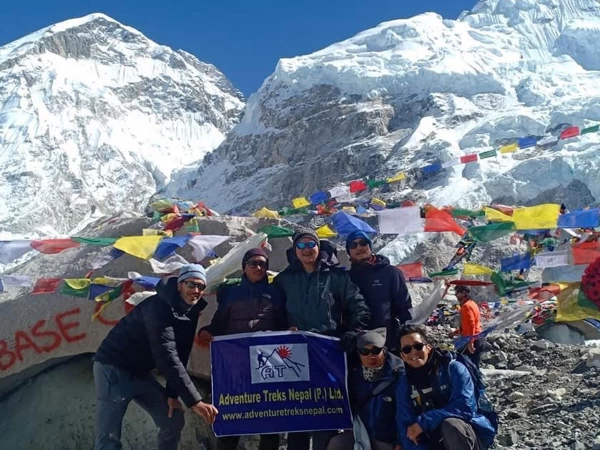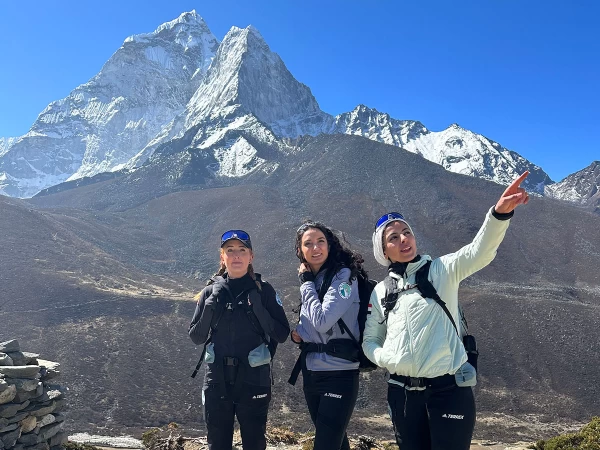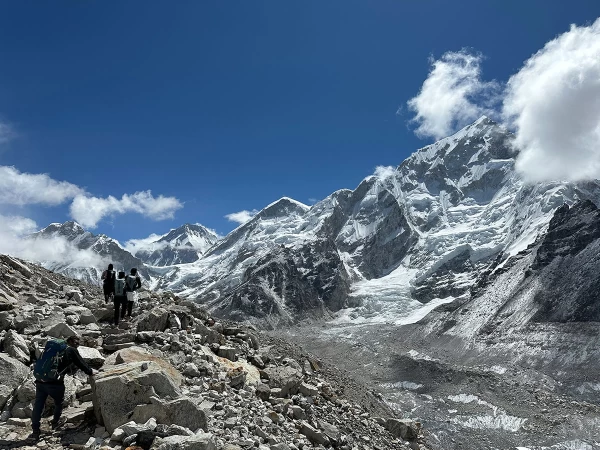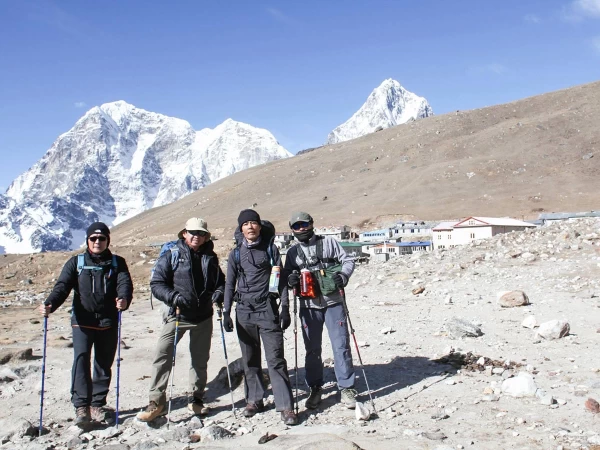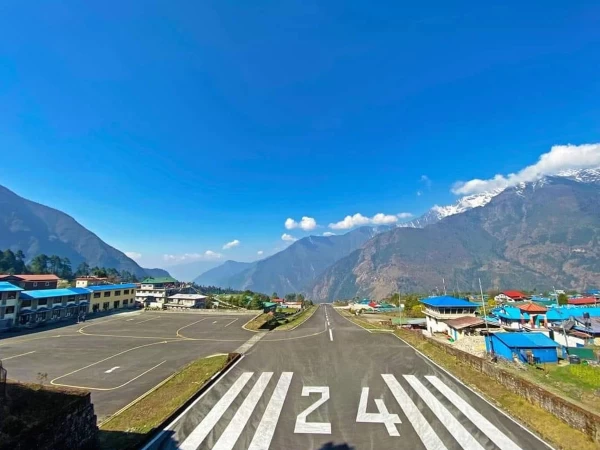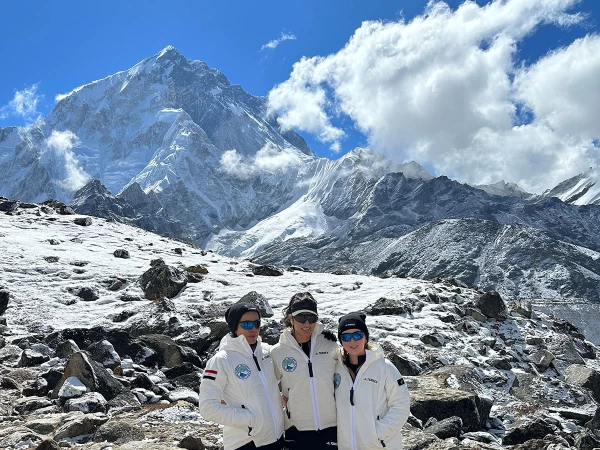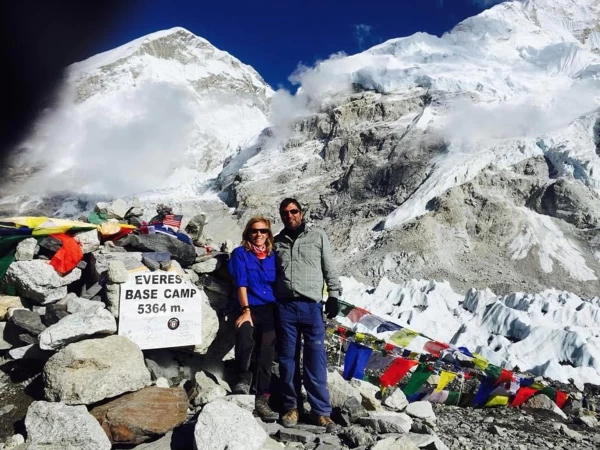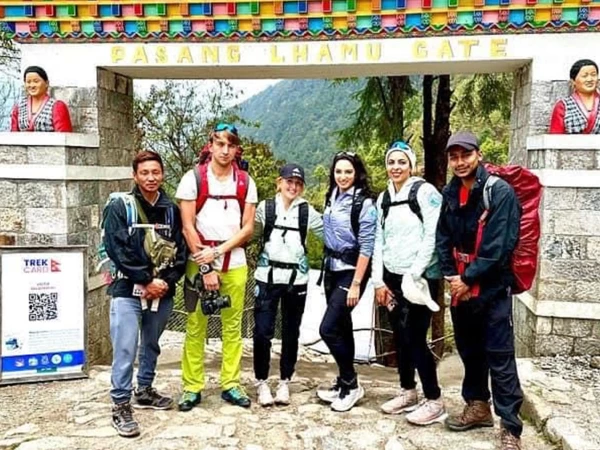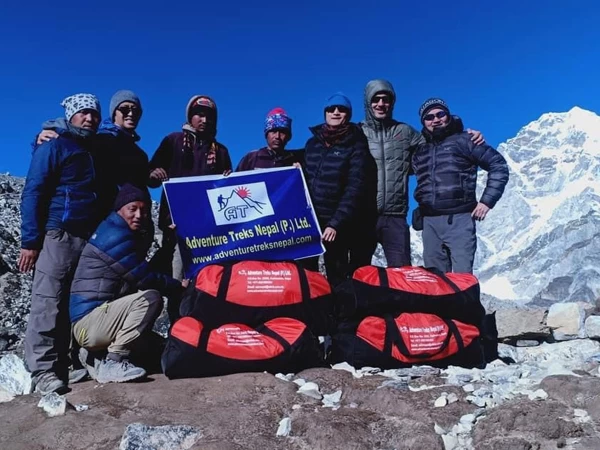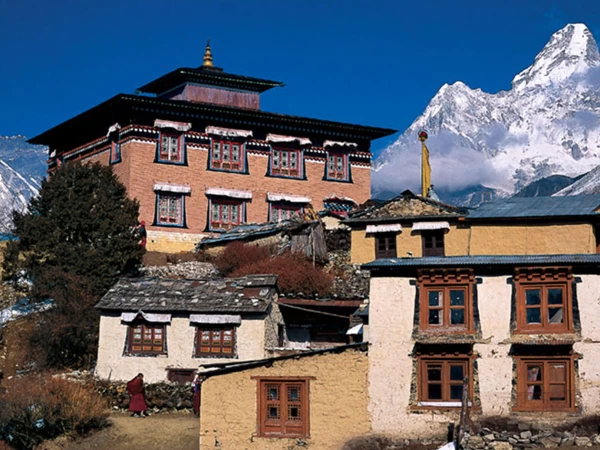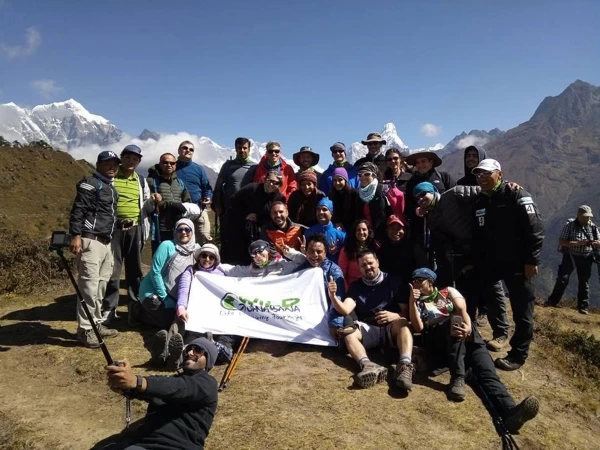The Everest Base Camp trek is a bucket-list adventure and a journey of a lifetime. Trek through diverse geography, witness breathtaking mountain landscapes, explore Sherpa villages steeped in traditions, and challenge yourself. This 16 days backpacking in the Himalayas of Nepal takes you to the base of the tallest mountain in the world, Mount Everest.
Following the iconic Everest Base Camp trek route, you will embark on an incredible expedition, conquering the most celebrated trekking destination in the world. It is not just a hike but a transformative journey, so lace up your boots and get ready to experience the wilderness and magic of the Himalayas!
You will begin the Everest Base Camp trek 16 days trip with your arrival in Kathmandu, the capital of Nepal. Spend a day exploring the historical monuments of the city, obtaining necessary EBC permits, and preparing/shopping for the trek. On day three, you will fly to Lukla and begin trekking with your guide and porter.
The Everest Base Camp trek route will leave you speechless with its natural wonders and untamed beauty. As you trek through dense rhododendron forests and beautiful Sherpa villages, you can see a glimpse of towering snow-capped peaks pierce the sky. The never-ending uphill climbing along lush hills will present the vastness of the Himalayas.
As you trek, you can instantly feel the disconnection from everyday chaotic city life. The gradual pace of trekking will allow you to unwind and introspect. You will get time to immerse yourself in the simplicity of the mountain lifestyle, where every steaming cup of tea will give you pure contentment.
It is not a luxury trip (although you have the option to upgrade to the luxury EBC trek), however the sense of peace and joy will be with you all the time. You will trek higher every day, overcoming thin air and relentless climbs. Test your physical and mental fortitude. Each step will build unshakeable confidence within you and unveil a newfound strength you never knew you possessed.
Every day, you will get to experience the warm hospitality of Sherpas and other mountain communities. Visit ancient monasteries and explore old stupas along the Everest Base Camp trail. Share meals with fellow trekkers and build memories to cherish forever. Enjoy nature and its different sides.
The Everest Base Camp trek route offers a panorama unlike any other. Trekkers get to witness heavenly views of numerous mountains such as Everest (8,849 m/29,032 ft), Lhotse (8,516 m/27,940 ft), Island Peak (6,165 m/20,226 ft), Makalu (8,463 m/27,766 ft), Nuptse (7,861 m/25,791 ft), Ama Dablam (6,812 m/22,349 ft), Thamserku (6,608 m/21,680 ft), etc.
Highlights
- Embark on a bucket-list adventure and a journey of a lifetime by doing the Everest Base Camp trek
- Explore the beauty of the Khumbu region, home to some of the tallest mountains on Earth and the famous Sherpa community
- Challenge yourself and push your limits
- Enjoy the simple life and clean food of the mountain
- Trek through rhododendron forests and glacier moraines
- Witness beautiful sunrises, mesmerizing sunsets, diverse landscapes, and jaw-dropping mountain panorama
- Go on adventurous side hikes during acclimatization days
- Reach the base of the tallest mountain in the world, Everest Base Camp
- Hike to Kala Patthar, the highest point of the trek
- Experience contentment in simplicity and make memories to cherish forever
What is the Everest Base Camp trek like?
The Everest Base Camp trek is not a technical climb, but the high altitude and several days of walking on rugged terrain make it demanding. You will leave the modern-day conveniences behind and embark on a journey in the remote mountains of the Himalayan range.
The Everest Base Camp trek route is remote, and even the closest mega-city, Kathmandu, is quite far away. Lukla is the gateway and the only way to affordably and quickly travel in and out of the region. Another alternative is helicopter flight, which is on a bit expensive side.
Trekkers have to be prepared for limited services, thin air, cold climate, long walking duration, and steep ascents & descents. This is not a camping trip, so you will spend nights in simple lodges. Beginner trekkers can finish the Everest Base Camp climb, however they have to understand and accept the challenges.
*Note: Luxury lodges are available at an additional cost. You will get a much better lodging experience with a private washroom, Western-style toilets, and services like charging, hot showers, WiFi, etc, included in the room cost.
How to train for the Everest Base Camp trek in Nepal?
Start your Everest Base Camp trek training well in advance. A 4 to 6 weeks of preparation time is recommended. During this duration, you have to progressively increase the intensity of your training to reach your peak fitness level.
Whatever activity you choose to do to improve your physical and mental capacity, note that consistency is the key. Do not overdo and listen to your body. Hiking, swimming, cycling, running, strength training, choose whatever option is available to you.
Practice regular long walks with a weighted backpack to build endurance and habit. Make sure to rest and give your body time to recover. Also, picture yourself trekking and completing the journey successfully. It will create a positive mindset within you.
*Tip: Train in the boots you plan to use during the trek. You will feel much more comfortable and stable in the mountains and can avoid the new-shoe blisters.
Who can do the Everest Base Camp trek? Are you ready for the voyage?
The Everest Base Camp trek challenge is manageable if you are prepared well. Previous trekking experience is not needed to join this trek, however participants have to be in decent shape. It is an adventurous trek with simple accommodation and meals. You indeed have to adjust a lot, but the journey is very rewarding, too.
Join our Everest Base Camp trek 2024 autumn departure and optimize your trip and success/safety rate with our team's support. Get the best Everest Base Camp trek cost with top-notch service. We have also custom-created our Everest Base Camp trek map to provide a better understanding of the trail.
Our Everest Base Camp trek price includes permit fees, accommodation and meals during trekking, Lukla flights, transportation (as per the itinerary), and accommodation in Kathmandu, and guide and porter service. If you can walk 6 hours a day and are fine with high altitude, you are ready to join the Everest Base Camp trekking.
What are some alternative treks in the Everest region besides Everest Base Camp?
Apart from the Everest Base Camp trek 16 days, there are options like the Gokyo Lakes trek, Three High Passes trek, Cho La Pass trek, Renjo La Pass trek, Everest View trek, EBC trek with helicopter return, and luxury EBC trek. All these packages have different difficulty levels. Pick the package that best suits your fitness and other requirements.
You can also tailor-make the Everest Base Camp trek 16 days as per your wish. For example, you can shorten the itinerary and combine a helicopter flight in and out of Lukla or a helicopter flight from Groak Shep to Lukla or Kathmandu. A helicopter flight adds more essence to your journey.
How much weight should I expect to carry in my backpack on the Everest Base Camp trek? What are the things to pack in my backpack?
You will use two luggage bags during the Everest Base Camp trekking. The first one is a duffel bag, which is carried by a porter. The Duffel bag weight limit is 9-10 kg per trekker. The second one is a daypack (backpack), which is carried by you. You can carry up to 5 kg in your backpack.
Pack the following things in your backpack and the remaining trekking clothes and equipment in a duffle bag:
- Reusable water bottle
- SPF, lip balm, etc
- Nuts, energy bars, snacks, etc
- Camera, charger, mobile phone, adapter, etc
- Map, journal/pen, money, documents
- A pair of gloves, scarf, beanie, sun hat, etc
- Small first aid kit, mini torch, and other essentials
Everest Base Camp trek with Adventure Treks Nepal: "More than 3 decades of legacy in the travel and tourism sector of Nepal."
Trekking to Everest Base Camp is a huge commitment for any individual, and we, Adventure Treks Nepal, will be your reliable partner in this adventurous endeavor. With more than three decades of expertise in the Himalayas of Nepal, we have established ourselves as one of the pioneers in the industry.
Our team is well-versed and very knowledgeable. Because of our long legacy with foreign travelers in Nepal, we have been accustomed to the international standard of traveling. Our trips are well-planned, curated, and organized. You will not feel any stress or hassle while doing Everest Base Camp trekking with us.
All of the logistics will be taken care of in advance by our team. We have priced our Everest Base Camp trek package just right to not compromise on the services. Whether you are planning to do a solo Everest Base Camp trek in Nepal or with your friends and families, we are here to help you curate your trip.



